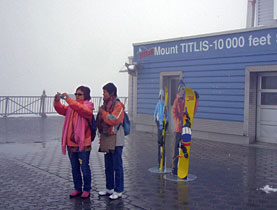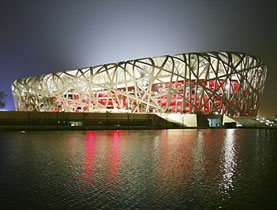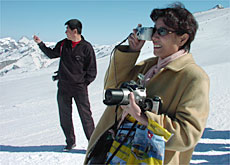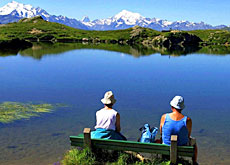Lucerne sets sights on Chinese tourists

A sign at the top of Mount Titlis tells the story of Chinese gymnast Donghua Li being inspired to win Olympic gold after seeing a Buddha-like shape in the rock.
Looking out from the 3,238-metre mountain’s viewing platform, Li could make out the figure of the Buddhist prophet seated on an inaccessible peak and bathed in sunlight.
He took it as a sign that despite the challenges ahead he could win gold at the 1996 Atlanta Olympics, a feat the Chinese-born gymnast went on to achieve that year as a Swiss national.
Today Mount Titlis is the most visited Swiss mountain resort among Chinese groups and Li’s tale is one the resort is happy to promote as part of its Sino-friendly approach.
Although the number of Chinese visitors to Switzerland has grown steadily over the past decade, tourism bosses expect 2008 to be slow with the Olympics taking place in Beijing in August and more Chinese staying home rather than going abroad.
Instead Lucerne tourism officials are hedging their bets on a more prosperous 2009. Part of their strategy is an all-out marketing drive at the Olympics, where Lucerne and the Lake Lucerne region will form the centrepiece of the government’s House of Switzerland exhibition at the Expo Park in Beijing.
It is only the second region to be featured at the Swiss exhibition, after the Valais at the 2006 Winter Olympics in Turin, and is providing SFr3 million ($2.9 million) of the House’s overall SFr4.6 million budget to promote the region and the Swiss brand and to wine and dine guests.
The idea has caught on and 12 other partners have signed up to take part, including UBS, Nestlé and Swiss Army knife maker Victorinox. Lucerne Tourism is coordinating the budget, to which all partners contributed SFr100,000.
Big potential
Marcel Perren, director of Lucerne Tourism, says the region offers a quick dose of Switzerland for groups on the typical whirlwind tour of Europe’s biggest sights.
“Our product fits very well with the Chinese. We can offer a little bit of Switzerland within Switzerland,” he told swissinfo.
“We have a small historic city and the lake and mountains that are all very close. It’s a little piece of what Chinese people think Switzerland has to offer: quality, nice nature, shopping, culture.”
A third of all Chinese visitors to Switzerland stay in the Lucerne and Lake Lucerne area, making it the top Swiss destination.
“For us now it is about improving the branding of Lucerne and the Lake Lucerne region so that if Chinese people travel to Europe and Switzerland they feel they must come here,” Perren explained.
For the city of Lucerne, the Chinese market remains small – three per cent of its overall visitors – but the potential of the country’s 1.3 billion population drives hopes for big returns.
“The potential is very big in China,” Perren said. “It’s never going to be a number one market for Switzerland, but in the next couple of years the number of overnight stays could double.”
Samosas and noodles
Titlis Rotair, the firm responsible for the nearby Mount Titlis resort and some of its assorted restaurants, shops and hotels, has learnt that a little goes a long way in catering to its major Asian tour groups.
Signs around the resort are in the main Asian languages, Chinese hymns figure among the background music at a resort lightshow and a Bollywood star advertises watches on a poster outside the glacier shop.
When tour buses pull up, Chinese, Indian or Thai chefs are called in to cater. During the afternoon, Chinese noodles and Mövenpick ice cream are the only takeaway options available on the mountain, and those tourists exiting at the base are met by an Indian snack van selling samosas and hot masala tea.
“We try not to be an old-fashioned, completely Swiss-style mountain. We’re more of a modern style of mountain,” André Küttel, marketing director of Titlis Rotair, one of the House of Switzerland exhibition partners, told swissinfo.
“Many others dream about the huge Chinese market that is coming. For us it’s already here. Now it’s about brand-building and becoming better known.”
Right path
Küttel says visitor numbers are particularly strong in the Lucerne region because it is lucrative for the Chinese tour operators who can sell tickets to various excursions. Switzerland also meets one of Chinese visitors’ main needs: shopping.
“The Chinese are not interested in alphorn blowing,” said Küttel. “It is nice for them to see, but they are interested in coming back from Europe with some status symbols. Like a Louis Vuitton bag from Paris or a Swiss watch. Watch shopping is a very important reason why they visit Switzerland.”
Top of the agenda in Beijing will be attracting more tourists and encouraging them to stay longer in Switzerland, thereby increasing the chances of spreading out the economic benefit.
“It’s important for us to slowly but continuously move towards people staying longer,” said Perren. “We are still going to have to wait a couple years for that but we are certainly on a right path.”
swissinfo, Jessica Dacey in Lucerne
2008 Lucerne city visitors
Swiss 26.4%
American 19.5%
German 9.8%
British 9.2%
Australian 4%
Indian 3.5%
Chinese 3.2%
Italian 2.2%
2008 Central Switzerland visitors
Swiss 42.1%
German 17%
American 7%
British 6.2%
Dutch 3.5%
Indian 2.7%
Chinese 2.1%
Switzerland Tourism opened the first European tourist information office in Beijing and both Lucerne Tourism and Titlis Rotair have been marketing in China since the 1980s.
In 2004 Beijing’s decision to grant European Union members and Switzerland “Approved Destination Status” (ADS) opened the door for everyone in China who could afford a trip to Europe, since they no longer needed to apply for special travel permission from their government.
To date, Chinese tourists choose to visit in guided groups as part of a European itinerary, but tour operators say more people are starting to come on their own.
According to a study conducted by Presence Switzerland, standard of life, political stability and attractive scenery, combined with an environmentally friendly attitude, all combine to form part of the positive image that Switzerland enjoys in China.
Another study by Switzerland Tourism says the Chinese market fares create “added economic value” with the average Chinese visitor spending three times more money in Lucerne than someone from Europe.
Switzerland Tourism reports that 230,180 Chinese visitors stayed overnight in Switzerland in 2007, nearly double the 119,266 figure from 2002. The market grew by 12% in 2007.
Regionally, central Switzerland attracts the most visitors, with around 78,000 overnights, followed by Zurich, Geneva and the Bernese Oberland. Lucerne is the most popular city destination with 34,500 overnights, followed by Geneva and then Zurich.

In compliance with the JTI standards
More: SWI swissinfo.ch certified by the Journalism Trust Initiative




You can find an overview of ongoing debates with our journalists here. Please join us!
If you want to start a conversation about a topic raised in this article or want to report factual errors, email us at english@swissinfo.ch.